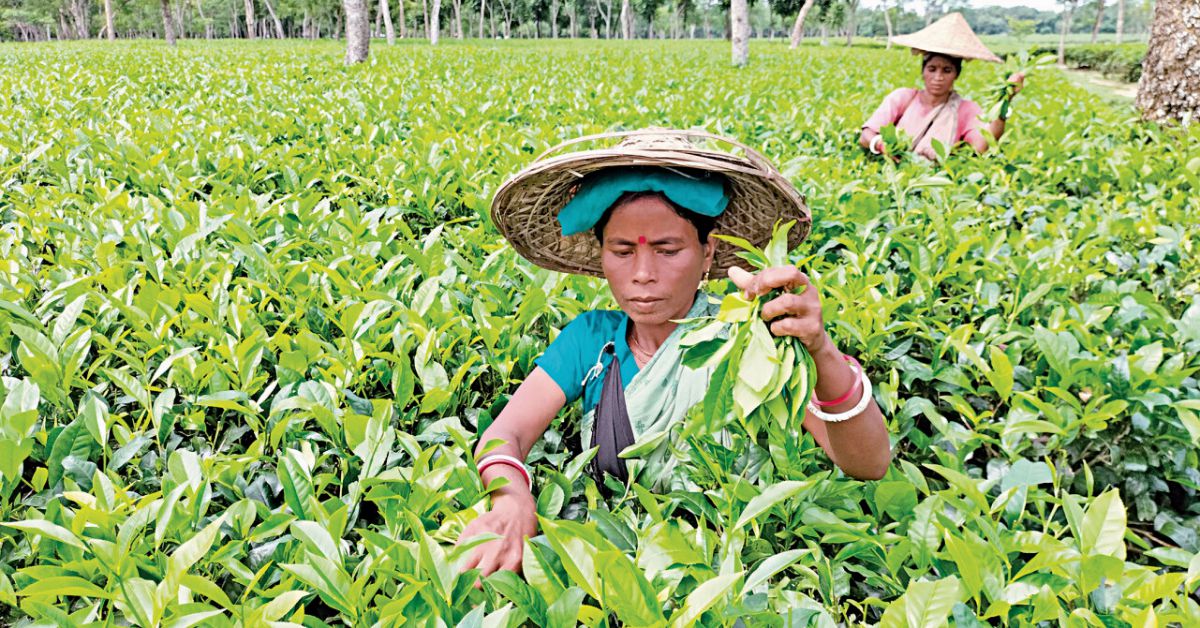A bitter brew: Climate change and the decline of Sylhet’s tea gardens

There's a certain poetic irony in the fact that while we sip our morning cha and post inspirational quotes about climate change on social media, the tea leaves themselves are quietly dying. Sylhet, once described as a place where the hills smelled faintly of tannins and nostalgia, now smells more like apprehension. Climate change is not knocking at our door politely anymore. It is behind the kitchen counter, stirring the pot and casually spilling hot tea all over our economy.
Bangladesh ranks as the ninth-largest tea producer in the world. Sylhet and its surrounding districts, Moulvibazar and Habiganj, account for the vast majority of production. These emerald slopes, immortalised in colonial postcards and honeymoon photos, yield around 9.7 crore kilograms of tea a year. But the romance ends there. The Bangladesh Tea Research Institute (BTRI) reports that yields at the historic Malnicherra Tea Estate, the oldest one in Bangladesh, have been declining by about 110 kg per hectare every year between 2012 and 2017. This conveys the message that our tea gardens are slowly bleeding out.
The weather in Sylhet has developed the emotional stability of a reality TV contestant. In the first three months of 2024, the region recorded significantly lower rainfall compared to the amount during the same period the previous year. By April 2024, Sylhet recorded 39.2 degrees Celsius, the highest temperature in history between 2006 and 2025. The tea bushes, delicate as they are, now face an existential dilemma: drown or dehydrate.
Tea plants are fussy by nature. They thrive on balance. But instead of moderate rainfall and gentle sunshine, they now endure flash floods followed by droughts—sometimes in the same week. Pest infestations have also become more aggressive, as warmer, wetter conditions turn Sylhet into an all-you-can-eat buffet for fungi and insects. To survive, farmers have resorted to chemical pesticides that degrade soil and pollute water. This resulted in lower yields, weaker plants, and suffocating humidity in which the workers spend their days plucking leaves while coughing through pesticide fumes.
And if you thought the suffering ends with the plants, think again. The real cost of your cup of cha is paid by the workers who pluck its leaves. There are over three lakh tea workers in Bangladesh, and nearly three-quarters of them are women. Many belong to marginalised ethnic communities and live in tin-roofed quarters that leak during every monsoon. When yields drop, their incomes fall too, because pay depends on how many leaves they can pick. For them, climate change is not an abstract debate—it is dinner.
Meanwhile, in air-conditioned conference rooms in Dhaka, someone would soon host yet another "stakeholder dialogue" on climate-smart agriculture. There will be slides, buzzwords and polite nodding. Then everyone will go home and drink imported coffee. Because why invest in irrigation systems, shade trees, and better wages when you can have a lovely panel discussion instead?
The BTRI has made some progress in developing drought-tolerant cultivars, but the work remains painfully small in scale. What Sylhet's tea gardens need is not another pilot project—they need real policy muscle. Irrigation canals, soil conservation, agroforestry, fair-trade wages, and credit support for smallholders are no longer optional. Without them, the industry will continue to crumble under a heatwave of neglect.
Globally, tea prices have been falling even as production costs rise. The result is a cruel paradox: farmers work harder for less, while consumers demand cheaper blends. We chase discounts like Olympic medals, never stopping to think who is actually paying for them. That "Buy One Get One" box of teabags is not a bargain—it is a warning. Discounted tea today is tomorrow's scarcity, neatly packaged with a smile.
Projections by the United Nations Food and Agriculture Organization (FAO) indicate that tea cultivation areas could shrink by 2050, and climate models forecast a 40 percent decline in tea yields in Northeast India and adjacent regions. Tea is not merely an export item; it is woven into the country's cultural fabric. It is what we start our mornings with, soothe our tempers with, and survive our politics with. Losing it would be like losing a national ritual—the one thing that unites us, regardless of how divided we are about everything else.
And yet, we remain blissfully oblivious. As long as the kettle boils, the problem does not seem to exist to us. But here is the inconvenient truth: the storm has already arrived in your cup. Every sip you take now carries the flavour of a changing climate, the bitterness of exploitation, and the faint aroma of apathy.
Perhaps the next time we sit down with a steaming cup of cha, we should pause for a moment of inconvenient gratitude. Because that comforting sip comes from a plant that is burning, a worker who is sweating, and a planet that is begging for a break. Climate change is not just altering the weather—it is rewriting the taste of tradition.
So, drink your tea slowly, savour it deeply, and remember: Sylhet's hills are not eternal. They are whispering, warning, and wilting—one leaf at a time. And if we do not start listening soon, the only thing left to steep will be regret.
Barrister Noshin Nawal is a columnist for The Daily Star. She can be reached at nawalnoshin1@gmail.com.
Views expressed in this article are the author's own.
Follow The Daily Star Opinion on Facebook for the latest opinions, commentaries and analyses by experts and professionals. To contribute your article or letter to The Daily Star Opinion, see our guidelines for submission.




 For all latest news, follow The Daily Star's Google News channel.
For all latest news, follow The Daily Star's Google News channel. 

Comments